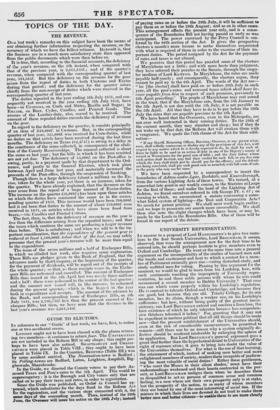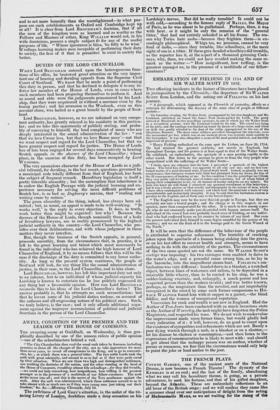UNIVERSITY REPRESENTATION.
IN answer to a proposal of Lord HADDINGTON'S to give two mem- bers to the four Scotch Universities, Lord BROUGHAM, it seems, observed, that were the arrangement now for the first time to be entered into, he should perhaps hesitate to give members even to Oxford and Cambridge. He went at the same time into a general argument on the incompatibility of the studies of learned men and the bustle and excitement and heat to which a contest for a mem- ber of Parliament naturally gave rise—voting disturbed study, and study unfitted men for voting. Passing by this argument fir the moment, we would be glad to learn from his Lordship, how, with such sentiments touching the impropriety of University repre- sentation, he and those noble persons with whom he acts could recommend a second member to Dublin University ? That case was one which came properly within his Lordship's regulation. lie is content to tolerate Oxford and Cambridge, not because they are good, but because they are old. Trinity College, for its one member, has its claim, though a weaker one, on his Lordship's sufferance; but how, without being guilty of the greatest incon- sistency, can Lord BROUGHAM extend and confirm a franchise, the bare existence of which he only tolerates because less comprehen- sive thinkers tolerated it before? For, granting that it may not be expedient in matters political that all old things should be made new—that the present establishment of the Universities should, even at the risk of considerable inconvenience, be permitted to remain—still there can be no reason why a system originally de- fective should be rendered intolerable by enlarging the sphere of its application. But Lord BROUGHAM'S general argument goes a great deal farther than the hypothetical denial to Universities of the right of represenation; it goes to bring into doubt the value of the Universities themselves. For what is the use of that learning, the attainment of which, instead of making men better and more enlightened members of society, renders them incapable of perform- ing the most valuable of social duties? Either these gentlemen, "who court the Muses in their silent shades," must have their understandings weakened and their hearts contracted in the pur- suit, or Lord BROUGHAM maligns them when he describes them as disqualified to act as persons of common sense and common feeling, in a case where not their own prosperity only is at stake, but the prosperity of the nation, to so many of whose members they are bound by one of the most interesting of social ties. If the science to which their lives are devoted do not tend to make them better men and better citizens—to enable them to see more clearly and to act more honestly than the unenlightened—to what pur- pose are such establishments as Oxford and Cambridge kept up at all? It is clear from Lord BROUGHAM'S doctrine, that if all the men of the kingdom were as learned and as worthy as the Fellows and Masters of either, King WILLIAM would not, in his wide dominions, possess a single subject fit for any of the useful purposes of life. "Where ignorance is bliss, 'tis folly to be wise." If college learning makes men incapable of performing their duty to society, the less of it that is permitted to exist in society the better,



























 Previous page
Previous page